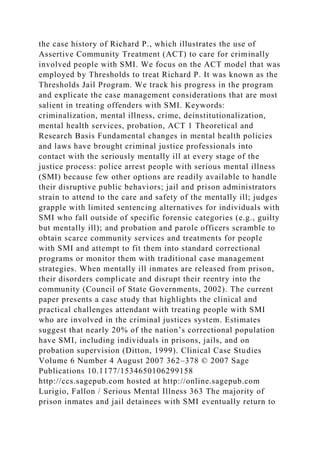Academic Responsibility In Reporting On Mental Illness And Crime

Table of Contents
The Perils of Sensationalism and Stereotyping in Media Reporting
Media bias and sensationalism often contribute to a distorted public perception of mental illness and its relation to crime. Sensationalized headlines and biased reporting frequently link mental illness directly to violent crime, ignoring the vast majority of cases where this is demonstrably untrue. This irresponsible reporting perpetuates harmful stereotypes and contributes significantly to the stigmatization of individuals with mental health conditions.
-
Negative Portrayals and Their Impact: Negative portrayals in the media reinforce pre-existing prejudices, leading to fear, misunderstanding, and discrimination against those with mental illnesses. This stigma can prevent individuals from seeking help, hindering their recovery and integration into society.
-
Examples of Irresponsible Reporting: Consider news stories that focus solely on extreme cases of violence committed by individuals with mental illnesses, neglecting to mention the overwhelming number of individuals with mental illnesses who are not involved in criminal activity. This selective reporting creates a skewed and inaccurate picture.
-
The Importance of Balanced and Nuanced Reporting: Responsible media outlets strive for balanced and nuanced reporting, presenting the complexities of the issue without resorting to generalizations or sensationalism. This involves presenting statistics accurately, showcasing the experiences of individuals with mental illnesses, and highlighting the work of mental health professionals. Ethical journalism necessitates a conscious effort to avoid perpetuating harmful stereotypes.
The Role of Data Accuracy and Statistical Interpretation
Accurate interpretation and reporting of statistical data are crucial in avoiding misleading conclusions about the relationship between mental illness and criminal behavior. The misuse of statistics can have severe consequences, exacerbating existing stigma and influencing policy decisions based on flawed information.
-
Correlation vs. Causation: A common error is confusing correlation with causation. While some studies may show a correlation between mental illness and criminal behavior, this does not automatically imply a causal link. Many other factors, such as socioeconomic status, access to resources, and societal inequalities, contribute to criminal behavior.
-
Transparency in Research Methods and Data Sources: Responsible research requires transparency in methodology and data sources. Clearly outlining the limitations of the study and acknowledging potential biases is essential for maintaining data integrity and responsible research practices. Misrepresenting or selectively using data undermines the credibility of research and contributes to inaccurate public perception.
-
Ethical Implications of Misrepresenting Data: The ethical implications of misrepresenting or selectively using data are profound. Such actions not only mislead the public but can also fuel discrimination and prejudice against individuals with mental illnesses.
Ethical Considerations in Research and Publication
Research involving individuals with mental health conditions requires meticulous adherence to ethical guidelines. Researchers have a responsibility to protect the rights and well-being of participants, ensuring their privacy and confidentiality are upheld at all times.
-
Informed Consent and Participant Protection: Informed consent is paramount. Participants must fully understand the purpose, procedures, and potential risks of the research before agreeing to participate. Researchers must also actively protect participants from any harm, physical or psychological.
-
Confidentiality and Data Protection: Maintaining the confidentiality of participants' personal information is crucial. Data must be anonymized and securely stored, complying with all relevant data protection regulations. The breach of confidentiality can have devastating consequences for vulnerable individuals.
-
The Role of Ethical Review Boards and Peer Review: Ethical review boards (ERBs) play a vital role in ensuring that research proposals meet ethical standards before the research commences. Peer review processes further scrutinize research findings before publication, ensuring accuracy, validity, and adherence to ethical principles.
Strategies for Promoting Responsible Reporting and Reducing Stigma
Combating the stigma surrounding mental illness and crime requires a multi-pronged approach involving media outlets, researchers, mental health organizations, and the public.
-
Educating Journalists and Researchers: Providing journalists and researchers with training on the complexities of mental illness, the importance of accurate reporting, and the impact of stigma is crucial. This education should emphasize responsible communication strategies and ethical considerations.
-
Promoting Media Literacy: Educating the public about media literacy empowers individuals to critically evaluate news reports, identify biases, and recognize misleading information. This critical thinking is essential in combating the harmful effects of sensationalized reporting.
-
Collaborative Approaches: Collaboration between mental health organizations and media outlets can foster more accurate and responsible reporting. Joint initiatives, training programs, and fact-checking collaborations can help ensure the dissemination of accurate and sensitive information.
-
Promoting Positive Representation: Highlighting positive stories and showcasing individuals with mental illnesses who are thriving and contributing to society can help counteract negative stereotypes and reduce stigma. Positive representation fosters understanding and empathy.
Conclusion
Academic responsibility in reporting on mental illness and crime is paramount. Accurate, ethical, and nuanced reporting is crucial to combat harmful stereotypes, reduce stigma, and foster a more informed public understanding. By prioritizing data integrity, ethical considerations, and responsible communication, we can move towards a more compassionate and accurate representation of this complex issue.
Call to Action: Let's collectively strive for higher standards of academic responsibility in reporting on mental illness and crime, fostering a more empathetic and informed public discourse. Engage in critical analysis of media representations and promote responsible research and communication practices. Together, we can challenge harmful stereotypes and build a more inclusive society.

Featured Posts
-
 Nigeria Fuel Market Examining The Influence Of Dangote And Nnpc
May 09, 2025
Nigeria Fuel Market Examining The Influence Of Dangote And Nnpc
May 09, 2025 -
 Federal Reserve Interest Rates A Cautious Approach In Uncertain Times
May 09, 2025
Federal Reserve Interest Rates A Cautious Approach In Uncertain Times
May 09, 2025 -
 Harry Styles Reacts To Awful Snl Impression The Full Story
May 09, 2025
Harry Styles Reacts To Awful Snl Impression The Full Story
May 09, 2025 -
 Nato And Palantir Ais New Frontier In Public Sector Applications
May 09, 2025
Nato And Palantir Ais New Frontier In Public Sector Applications
May 09, 2025 -
 Investigation Leads To Nc Daycare License Suspension
May 09, 2025
Investigation Leads To Nc Daycare License Suspension
May 09, 2025
